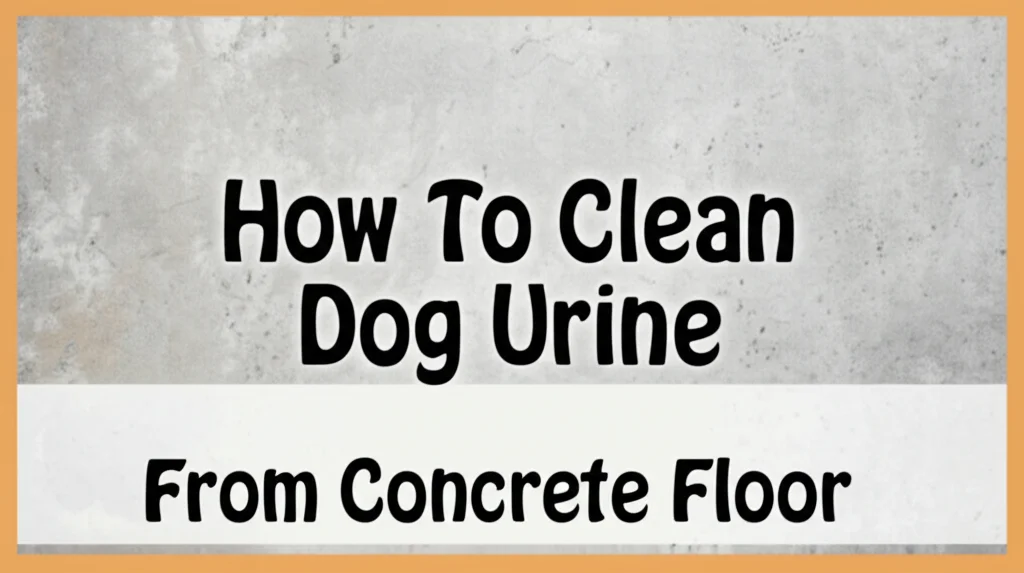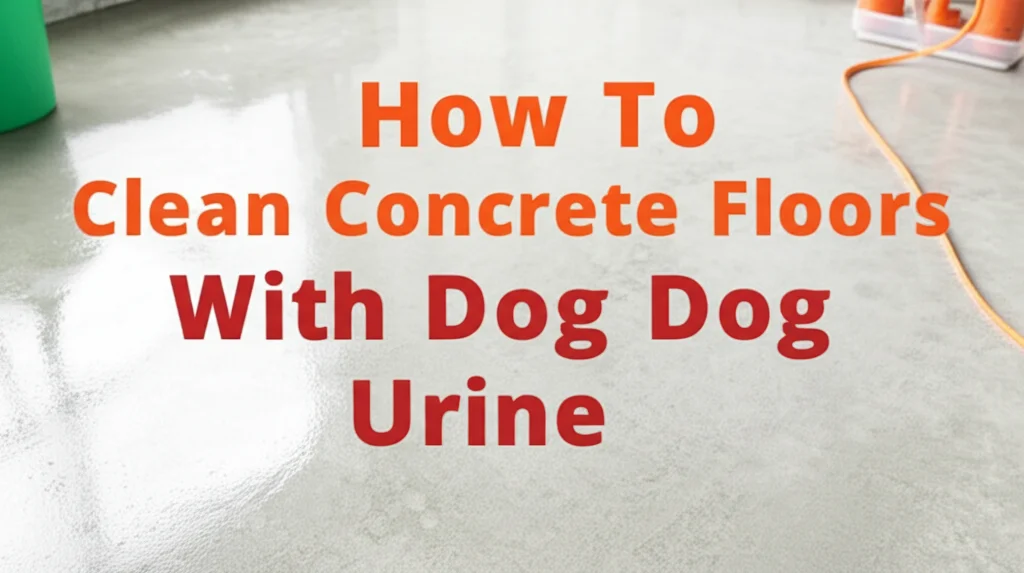· Home Cleaning · 7 min read
How To Clean Dog Urine From Concrete Floor

Dealing with Dog Urine on Concrete: A Quick Guide
Is your concrete floor bearing the unfortunate mark of dog urine? Don’t worry, it happens! Accidents are a part of pet ownership, and concrete, while durable, can absorb urine, leading to lingering odors and unsightly stains. This article will guide you through the most effective methods to clean dog urine from concrete, restoring your floor to its former glory. We’ll cover everything from immediate action steps to deep cleaning solutions, ensuring a fresh and hygienic space for you and your furry friend. Let’s tackle this problem head-on and get your concrete floor clean and odor-free.
Quick Answer: To clean dog urine from concrete, immediately blot up as much liquid as possible. Then, create a solution of equal parts white vinegar and water, apply it to the affected area, let it sit for 10-15 minutes, scrub, and rinse thoroughly. For stubborn odors, use an enzymatic cleaner.
Key Takeaways:
- Act Fast: The quicker you address the urine, the easier it is to clean.
- Vinegar is Your Friend: A simple vinegar solution is often effective for initial cleaning.
- Enzymatic Cleaners are Powerful: They break down the urine at a molecular level, eliminating odors.
- Thorough Rinsing is Crucial: Remove all cleaning residue to prevent re-soiling.
Why Concrete Absorbs Dog Urine & The Challenges It Presents
Concrete isn’t waterproof. It’s porous, meaning it has tiny holes that allow liquids like dog urine to seep in. This absorption is the biggest challenge when cleaning. Once the urine penetrates the concrete, it doesn’t just sit on the surface; it soaks deep down. This leads to a persistent odor that can be difficult to eliminate with standard cleaning methods. Furthermore, the uric acid in urine can cause discoloration and even damage the concrete over time.
Immediate Action: The First Steps to Cleaning Dog Urine
When you discover an accident, speed is essential. The longer the urine sits, the deeper it penetrates and the harder it becomes to remove the stain and odor. Here’s what to do immediately:
- Blot, Don’t Rub: Use paper towels or an old cloth to blot up as much urine as possible. Rubbing will only spread the urine and push it further into the concrete.
- Apply Pressure: Stand on the paper towels to apply pressure and absorb more liquid. Repeat this process with fresh towels until the area is as dry as possible.
- Ventilate the Area: Open windows or turn on a fan to help air out the space. This will help dissipate the initial odor and speed up the drying process.
- Avoid Heat: Don’t use a hairdryer or other heat source to dry the area. Heat can set the stain and odor, making it even more difficult to remove.
The Power of Vinegar: A Natural Cleaning Solution
White vinegar is a fantastic, natural cleaner for dog urine on concrete. Its acidity helps neutralize the alkaline components of urine, breaking down the odor-causing compounds. Here’s how to use it:
- Mix the Solution: Combine equal parts white vinegar and water in a spray bottle. For a stronger solution, you can use more vinegar, but always dilute it with water.
- Apply Generously: Spray the vinegar solution liberally onto the affected area, ensuring it’s thoroughly saturated.
- Let it Sit: Allow the solution to sit for 10-15 minutes. This gives the vinegar time to penetrate the concrete and break down the urine.
- Scrub the Area: Use a stiff-bristled brush to scrub the area vigorously. This helps loosen the urine and lift it from the concrete pores.
- Rinse Thoroughly: Rinse the area with clean water, ensuring all traces of vinegar are removed. You may need to rinse several times.
Enzymatic Cleaners: The Deep-Cleaning Experts
For stubborn odors and stains, enzymatic cleaners are your best bet. These cleaners contain enzymes that break down the uric acid in urine at a molecular level, eliminating the odor completely. Unlike masking agents, enzymatic cleaners don’t just cover up the smell; they destroy the source of the odor.
- Choose the Right Cleaner: Look for an enzymatic cleaner specifically designed for pet urine. These are readily available at pet stores and online.
- Follow Instructions Carefully: Each cleaner has specific instructions, so read and follow them carefully. Generally, you’ll need to saturate the affected area with the cleaner.
- Allow Sufficient Dwell Time: Enzymatic cleaners require time to work. Most require several hours, or even overnight, to fully break down the urine.
- Avoid Other Cleaners: Don’t use other cleaners in conjunction with enzymatic cleaners, as they can interfere with the enzymes’ effectiveness.
- Blot, Don’t Rinse: After the dwell time, blot up any excess cleaner with paper towels. Rinsing is usually not necessary and can reduce the cleaner’s effectiveness.
Baking Soda: A Powerful Odor Absorber
Baking soda is a natural odor absorber that can be used in conjunction with vinegar or enzymatic cleaners. It helps neutralize any remaining odors and leaves your concrete floor smelling fresh.
- Apply After Cleaning: After cleaning with vinegar or an enzymatic cleaner, sprinkle a generous amount of baking soda over the affected area.
- Let it Sit: Allow the baking soda to sit for several hours, or even overnight.
- Vacuum or Sweep: Vacuum or sweep up the baking soda.
- Repeat if Necessary: If the odor persists, repeat the process.
Preventing Future Accidents & Maintaining a Clean Floor
Prevention is always better than cure. Here are some tips to prevent future accidents and maintain a clean concrete floor:
- Regular Potty Breaks: Ensure your dog has regular opportunities to relieve themselves outside.
- Training: Proper house training is crucial.
- Address Underlying Issues: If your dog is having frequent accidents, consult a veterinarian to rule out any underlying medical conditions.
- Regular Cleaning: Sweep or vacuum your concrete floor regularly to remove dirt and debris.
- Seal the Concrete: Consider sealing your concrete floor to make it less porous and more resistant to stains and odors. You can find more information about sealing concrete floors here.
FAQ: Your Questions Answered
Q: Can I use bleach to clean dog urine from concrete?
A: While bleach can disinfect, it’s not recommended for cleaning dog urine on concrete. Bleach can react with the ammonia in urine, creating toxic fumes. It can also damage the concrete and discolor the surface.
Q: How do I get rid of old, set-in dog urine stains?
A: Old stains require more aggressive treatment. Start with an enzymatic cleaner and allow it to dwell for an extended period (24-48 hours). You may need to repeat the process several times.
Q: Will the urine odor eventually disappear on its own?
A: No, the odor is unlikely to disappear completely on its own, especially if the urine has penetrated deep into the concrete. It will likely linger and worsen over time.
Q: Is it safe for my dog to be around vinegar while I’m cleaning?
A: Vinegar is generally safe for dogs, but it’s best to ventilate the area well and keep your dog away from the wet cleaning solution until it’s dry.
Conclusion: A Fresh Floor is Within Reach
Cleaning dog urine from concrete can be a challenge, but it’s definitely achievable. By acting quickly, using the right cleaning solutions – like vinegar and enzymatic cleaners – and following the steps outlined in this guide, you can eliminate stains and odors, restoring your concrete floor to a clean and hygienic state. Remember, consistency is key. Regular cleaning and preventative measures will help keep your floor fresh and odor-free for years to come. Don’t let accidents ruin your home; take control and enjoy a clean, happy space with your furry companion. If you’re dealing with other flooring types, you might find our guide on how to clean luxury vinyl plank flooring helpful.




